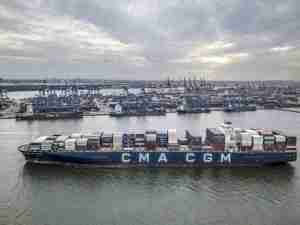Singapore's PSA, a port operator owned by government investment arm Temasek, has approached P&O, the UK company said, and may offer 3.5 billion pounds. That would trump a 3.33-billion-pound offer by state-backed Dubai Ports World.
Shipping experts say the deal is strategic for both bidders. PSA needs to strengthen its position in India, while Dubai Ports World aims to become a global player in ports although few port assets are up for grabs.
'PSA is interested because of the P&O ports in India and Australia. They (P&O) are very strong in these two markets,' said John Ong, a former PSA senior executive who now runs his own port consulting business Channels & Trends.
PSA runs just one small port in the south of India and none in Australia, while P&O has four terminals in India, one in Sri Lanka and four in Australia.
P&O said the approach from PSA valued its stock at 470 pence per share, compared with an earlier offer of 443 pence a share from Dubai Ports. Temasek confirmed the move, but it and PSA declined to comment on details.
P&O's shares jumped over six percent to 498 pence in early trade on Jan. 11 in London.
A counter bid has been rumored ever since Dubai announced its plans at the end of November, and talk gained momentum when PSA began to buy shares in P&O.
Industry watchers have long expected PSA to make a major acquisition, and a successful offer would make it the world's biggest ports group -- surpassing Hong Kong's Hutchison Whampoa -- while securing Singapore's strong trade and transport links.
'Container ports is a rapidly maturing business in Singapore and PSA is doing the right thing. It was pretty clear from the start that PSA would have to go up against Dubai after they made an offer,' said a transport analyst at a Singapore stockbroker.
A multi-billion dollar bidding war will not be a problem for either of the companies involved, both of which are backed by wealthy governments eager to invest abroad.
'Generally, there is a sense that PSA is an aggressive bidder and payer,' said an analyst at a European bank in Singapore.
Temasek is set to receive some S$900 million (313 million pounds) in cash next month from a payout of excess funds by Neptune Orient Lines, a container liner it controls.
'It's a strategic buy (for Singapore) and they have the money,' said a senior banker who is not involved in the deal.
Dubai, part of the United Arab Emirates and a beneficiary of higher oil prices, is scouring the globe for corporate assets, while Singapore's Temasek last year spent billions of dollars on stakes in Chinese banks.
Both Dubai and Singapore are relatively small in area and population but harbour global ambitions, and are increasingly competing head-to-head to secure their positions as regional transportation, tourism, and financial centres.
Both are important air and seaports, essential infrastructure for boosting trade and tourism. Both want to boost visitor arrivals and investment in their respective economies.
PSA still handles more than half of its total container volume in Singapore -- the world's busiest container port -- but is under pressure to reduce its dependence on the city-state.
PSA, the world's second-largest container port operator, bought two sets of port assets for more than $1 billion (570 million pounds) in Hong Kong -- home of its arch-rival Hutchison -- last year to give it better access to China's booming export and import market.
It also has investments in ports in Belgium, Brunei, China, India, Italy, Japan, the Netherlands, Portugal, South Korea and Thailand.
Prices for port assets -- most of which are state-controlled -- have risen strongly in recent years, fuelled by a three-year boom in shipping on the back of blistering growth in Chinese demand, a global economic recovery and expanding trade.
Over 90% of the








